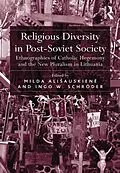Since the end of state repression against religion, two major processes have taken place in the formerly socialist countries: historically dominant churches strive to reassert their position in society, while new religious groups and ideas from various parts of the world are proliferating. This generates pluralism of religious communities and individual religious attitudes. Religious Diversity in Post-Soviet Society presents the first collection of ethnographies of this new religious diversity for Lithuania, a country that has a long history of a dominant Catholic Church. The authors reveal how Catholicism has become increasingly diversified and other religions (Charismatic Protestantism, Baltic Paganism, Eastern religions and other alternative spiritualities) are claiming their space in the religious field.
Autorentext
Milda Aliauskiene is a Postdoctoral Fellow at the Centre for Oriental Studies at Vilnius University and a Lecturer in Sociology at Vytautas Magnus University, Kaunas, where she teaches courses on religion and society, contemporary processes of religious group formation and religion and politics. Her 2009 dissertation was entitled "Manifestation and Peculiarities of New Religions in Lithuania: the Case of the Art of Living Foundation". She has published several articles on contemporary religiosity in Lithuania, focusing on New Age, the Art of Living Foundation, and Satanism, which are based on the material collected during her fieldwork. Her research interests include secularization, religious pluralism, religious fundamentalism, new religious movements, New Age and Neo-Hinduism. Ingo W. Schröder is a Senior Researcher at the Social Anthropology Centre, Vytautas Magnus University, Kaunas, and an Adjunct Professor (Privatdozent) of Social Anthropology at Philipps University, Marburg. He was a Senior Research Fellow from 2007-10 at the Max Planck Institute for Social Anthropology in Halle/Saale in the research project "The Catholic Church and Religious Pluralism in Lithuania and Poland". His main geographical fields of expertise are Eastern Europe and Native North America, and his research has focused on Catholicism, Neopaganism, socialism and postsocialism, the politics of identity, heritage and culture, as well as urban anthropology. His most recent publication is the edited volume (with Asta Vonderau) Changing Economies and Changing Identities in Postsocialist Eastern Europe (2008). In 2008/2009 he spent a year of fieldwork on urban religiosity in Lithuania.
Inhalt
Introduction, Milda AliSauskien?, Ingo W. Schröder; Chapter 1 Catholic Majority Societies and Religious Hegemony: Concepts and Comparisons, Ingo W. Schröder; Chapter 2 The History of Religion in Lithuania since the Nineteenth Century, Ar?nas Streikus; Chapter 3 "We Are All in Exile Here": Perceptions of Death, the Soul, and the Afterlife in Rural Lithuania, Lina Pranaityt? Wergin; Chapter 4 The Elusive Religious Field in Lithuania, Ingo W. Schröder; Chapter 5 From Confrontation to Conciliation: On Syncretic Rapprochement between Catholics and Charismatic Evangelists in Lithuania, Gediminas Lankauskas; Chapter 6 Romuva Looks East: Indian Inspiration in Lithuanian Paganism, Michael F. Strmiska; Chapter 7 The New Age Milieu in Lithuania: Popular Catholicism or Religious Alternative?, Milda AliSauskien?; Chapter 8 Muslims in Catholic Lithuania: Divergent Strategies in Dealing with the Marginality Status, Egd?nas Ra?ius; Chapter 9 The Neo-Buddhist White Lotus Movement in Search for Legitimacy, Donatas Glodenis; conclusion Concluding Thoughts, Ingo W. Schröder;
